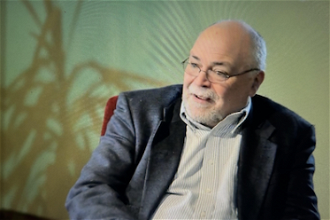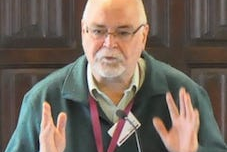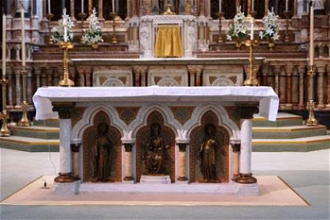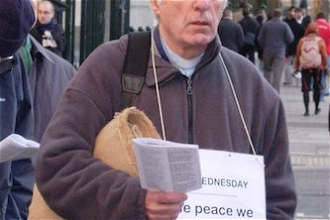Text: Fr Philip Endean SJ at Soho Mass
Fr Philip Endean SJ, Editor of The Way, gave the following homily at the Mass for London's gay community on Sunday at Our Lady of the Assumption Church in Warwick Street. Today's liturgy gives us two contrasting pictures of Christ's disciples after Easter.
The first reading is one of the passages early in the Acts of the Apostles where Luke is speaking of a harmonious band of believers.
Earlier, we've been told that they are united heart and soul, sharing all that they have in common.
Now we hear of them coming together in the portico of Solomon, re-enacting the ministry of Jesus. Just as the sick strove to touch the hem of Jesus' garment, so here they seek to fall under Peter's shadow. The resurrection of Jesus generates a fellowship of peace, a peace that radiates healing. John's gospel strikes a different note. It speaks of disciples gathered in hiding. The doors are locked, for fear of the Jews. And it is on this picture that I want to concentrate, at least for the next few minutes.
After all, even in Luke the harmony did not last: they had to cope with believers who began to withhold their cash, and had to put some authority structures in place, and much more importantly they had to struggle with the issues raised by Paul's conversion and subsequent ministry.
There are, of course, some poignant similarities between John's disciples and ourselves. We're not behind locked doors-but outside the church there are people peacefully demonstrating who in all sincerity and conviction think it profoundly wrong that a liturgy like this should take place. And previous experience has led us to be anxious about what they might do to disrupt our gathering.
The point is that the grace and gospel of the risen Christ addresses a broken world, a fragmented community. It's not something we just behold and adore; it's something which engages with the realities of sin among us, with the struggles that sin is already unleashing within us.
Somehow it has to touch this reality. This is what is happening when Christ appears to his frightened disciples. It is in this context that Thomas cries out in worship, 'my Lord and my God': the strongest and most explicit statement in the New Testament about the identity of Jesus. Jesus, risen from the dead, invites Thomas the frightened disciple, and in him all of us, to thrust his hand into the wounds and wiggle it around (the Greek words are intensely physical).
And this physical Jesus, risen from the dead, is both Lord and God. I don't think it is any accident that the revelation of Christ's risen glory comes in just these terms to a community feeling itself under pressure. The insight happens in the way it does precisely because the people who are given it are living in painful conflict.
John's Christianity is still within Judaism-historically it is before the parting of the ways between Jews and believers in Christ. But clearly the Johannine believers have to reckon with the possibility of being thrown out of the synagogue (we get the technical legal term in the story of the man born blind in chapter 9).
Their Lord had come to his own, and his own had not accepted him. And his servants in the Johannine Church who have remembered and preserved this story are no different from their master: they live with the prospect of an hour coming when people will kill them and think they are doing service to God.
Why does this conflict happen? When Christ comes as a herald of God's boundless love and the fullness of revelation, he provokes a crisis in all who hear his word.
People have to decide whether or not to accept his stupendous, scandalous message-and in doing so they reveal the truth about themselves. It's a conflictual business. And it is to a community rocked by such conflicts that the risen Jesus, the First and the Last, the living One who holds the keys of death and Hell, appears-appears to console, confirm, mission his beleaguered disciples. The sheer strength of his message is tailored to the disciples' discouragement. The Jewish establishment had promised sure and tested ways to God, a range of sacred mediations of the divine: the Law, the various observances of Temple and Sabbath. But they have not worked, and now something greater is here. Jesus is not just the way to the Father: Jesus and the Father are one. Jesus is Lord and God-just is God. No longer are we speaking of ways to God, mediations of God: God's own self is present, in the utterly tangible, if mysterious, reality of a risen body.
The conflict brings this reality out; it is because of the conflict that the revelation emerges. It is because the available religious structures are found wanting that Jesus can become manifest, absolutely reliable, gloriously physical. The relevance of this message is all too obvious for believers today who feel oppressed by the strength of others' commitment. The risen Jesus is there for us, triumphantly there, even when our fellow believers desert us, and seek to thrust us to the margins.
And maybe this is all that should be said to this community today.
But I'd like nevertheless to venture a little further, into territory that might be yet more difficult. Something, I think, also needs to be said about the quality of hope we need to maintain.
If God's Word addresses human brokenness and sinfulness, then, as liberation theologians like Jon Sobrino remind us, it is those most obviously and immediately touched by those realities-the poor, the marginalized, the outcast-who have a privileged role in conveying the truth of grace. It's not surprising, therefore, that this gospel, and this kind of theology, encounters resistance, the protest that surely God's Word is for everyone, not just for the poor.
And this protest is not false-merely the exaggeration of a truth: the truth that though conflict and partiality may figure large at the outset of the story, John's Jesus is the agent of a God who gives his Son out of love for the world; and he dies in order to gather into unity all the scattered children of God. The Gospels and early Christianity are seared by the conflicts between the disciples of Jesus and other Jews. It has taken the unspeakable reality of Auschwitz, of the Shoah, the outrage (why we use the sacred word 'Holocaust' in this connection is beyond me) to wake us up to the antagonisms at the very root of our tradition.
But the grace that liberates us is grace from a God whose sun shines on the bad and the good alike, and whose will is that we should love our enemies, doing good to those who hate us.
There is an aggressive competitiveness behind how John imagines Jesus: what we've got is no mere mediator of the kind that the Jews are so proud of; what we've got is the Word who is God, the one who has come down from heaven and tells us of what he has seen and heard there, the one to whom God has really entrusted all things. Now, there's a truth here, obviously-but perhaps we need to move beyond the partisan ways in which John encourages us to think about it.
The conflicts surrounding Christianity in its origins, like the conflicts surrounding this community here, can only, in God's sight, be provisional.
As grace comes to grip us, we can, gradually, let go of the conflicts. And perhaps Luke's vision becomes important here-not as an account of what once might have been, but of the community that is God's promise for our ultimate future. When Jesus' Word first touches us, it engages with the violence in our sinful society, and cannot but be expressed in ways reflecting that violence-even as it counteracts it. But if we let that Word abide in us, make its home in us, then we can gradually take down those barriers that we erect for fear of the Jews in our day.
Their threats will come to mean nothing to us, because of the joy we have been given which is complete, because of the joy that no-one can take from us. If we are believers, if we have life in Jesus' name, then gradually our hearts will be expanded-we will come to love with God's own love, and we will indeed be united heart and soul, not only among ourselves, but also with all God's people, with all God's creation, even with those who are persecuting us.





















